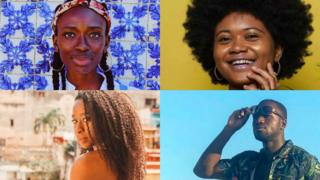This website uses cookies so that we can provide you with the best user experience possible. Cookie information is stored in your browser and performs functions such as recognising you when you return to our website and helping our team to understand which sections of the website you find most interesting and useful.
 Image copyright Ezrany/Barnabas Kelemen/Hanish
Image copyright Ezrany/Barnabas Kelemen/HanishDo black people have a different travel experience to other tourists? For a variety of reasons, a younger generation of black people is now taking more foreign holidays than their parents, and a community has grown up of those who share their experience of travelling while black.
"Having no hair, always wearing red lipstick, having very dark skin - I stand out in many places," Jessica Nabongo told the BBC.
"There was a queue to take pictures with me at the Taj Mahal in India! Many have never seen a Black person in their life. Though it becomes annoying after a while, I have to understand the context."
She has fulfilled her dream of visiting every country in the world, becoming the first Black woman to do so.
"Passport privilege is a thing, and having a US passport helped me, but having a Ugandan passport helped as well," she told the BBC.
Following Jessica's headline-grabbing solo travels, Liz, Briona, Kojo and Jess tell us about their own experiences of being black tourists.
'I should have charged for photos'
"When I was younger I was more unsure how I would be received as a black person - and there was the fear that my parents and older Black people in my life had put on me," Liz Ogbonna-Godfrey tells the BBC.
"Now, I take on board people's views and opinions but I allow myself to experience the destination for myself," says the 28-year-old Londoner born to a Nigerian family.
"China was a great experience as I've always been intrigued by the culture, and love their food."
She says she didn't mind the stares she got, but laughs at the memory of a stranger who suddenly thrust their baby into her hands with no warning.
"There was no sort of communication to say: 'Can I take photo with you and my baby?' Looking back, I should have charged for photos!"
Cuba was one of Liz's favourite trips. "I didn't feel like a tourist - I felt free and comfortable," she says.
"I was able to show off my salsa moves, practise my Spanish and dance the night away until dawn."
'We're paying homage to our ancestors'
Briona Lamback, 24, is a freelance writer from Maryland, US.
She says she wants to pay tribute to generations gone by, who mostly never had the privileges she and others now enjoy.
"Our access to travel has been historically tied to colonisation or immigration. We're paying homage to our ancestors to be travelling on our own free will."
She has fond memories of a trip to the Philippines that she had been planning her whole life. "My paternal great-grandmother was Filipina and black, so I have a natural affinity for the country," she adds.
A friendly stranger let Briona hop on his scooter to the beach when she was struggling to catch "one of El Nido's famous sunsets".
"I felt truly carefree and joyful in those moments and all it took was not being afraid to trust people".
'We can all co-exist'
It's a sentiment Kojo Brown, 27, agrees with.
"Meeting new people, who then become good friends makes my travel experience memorable," the British-Ghanaian investment banker told the BBC.
Recent holidays have seen him road-tripping from South Africa to Eswatini (previously known as Swaziland), snorkelling in Cancun and watching the Northern Lights in Iceland.
There were also trips to Russia, Slovakia, and China.
"There is no country I would refuse to return to because of my race," Kojo says.
"It's been cool to interact with people in countries where seeing black people is rare and showing them that we can all co-exist."
But for other people this hyper-visibility can feel like a burden.
'Not a black person, just a person'
"We are inadvertently representing black people as a whole," says Jessica Anyan-Brown, a 27-year-old junior doctor from London.
"It can be tiring teaching curious people about my hair."
Plus, she says, there are some who wrongly assume all black people are African-American. "They haven't come across many black Brits, so will have preconceptions about that too."
It is partly what made Jess's visit to her parents' homeland of Ghana so refreshing. "Being there meant you weren't a black person but just a person, which brought real peace to me."
"The sense of 'home' was so strong. There's something really special about getting to know where you're from, as that shapes everything you do."
Despite its challenges, Jessica says she is proud to be part of the many young Black travellers "owning their destinies" and "living their best lives".
"Can I just say that the travel glow that I come home with is everything!"
"When the sun has been hitting my skin right, I'm hydrated, and feeling fitter because of all the exploring I've been doing... There's nothing like it."



 Africana55 Radio
Africana55 Radio 
